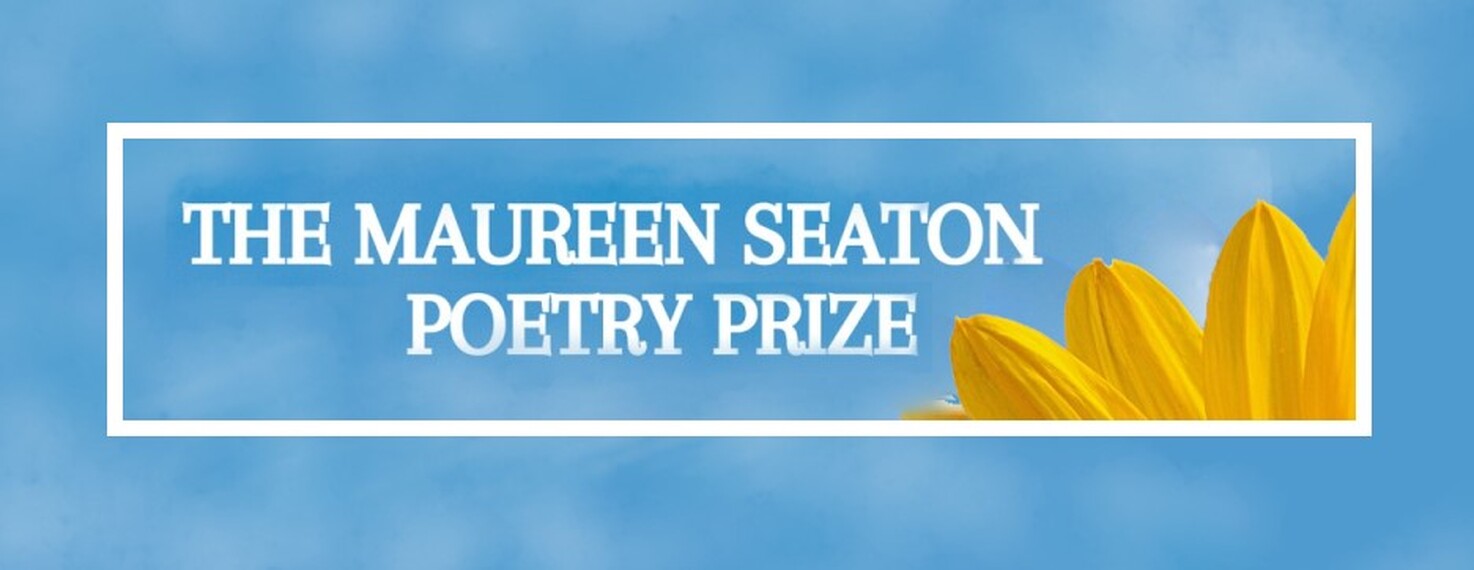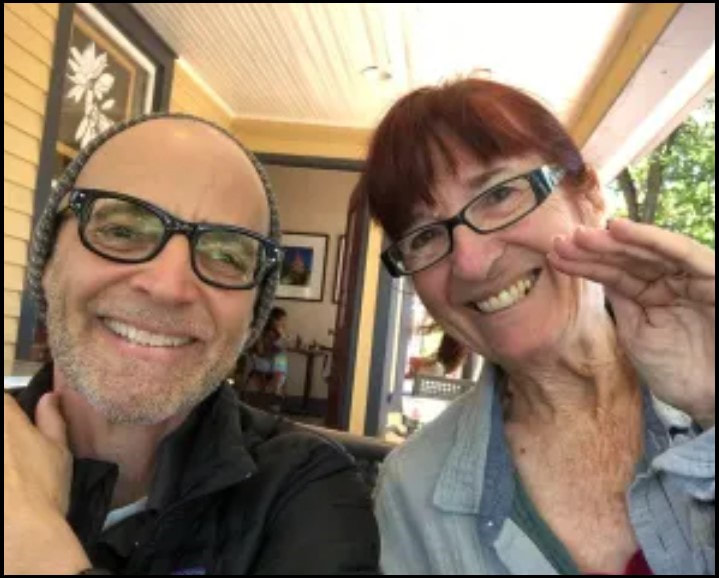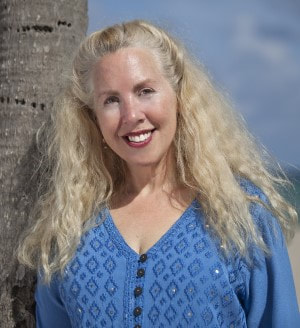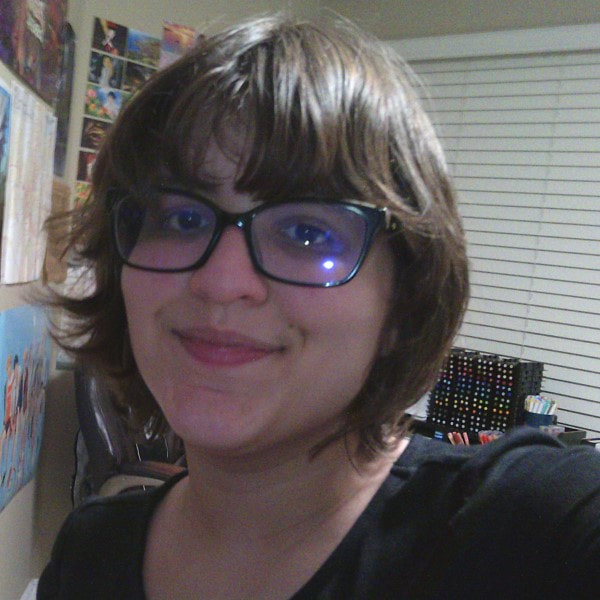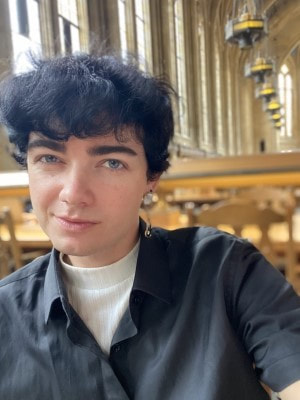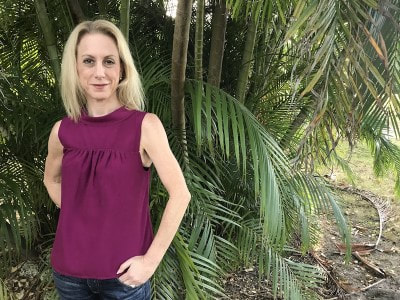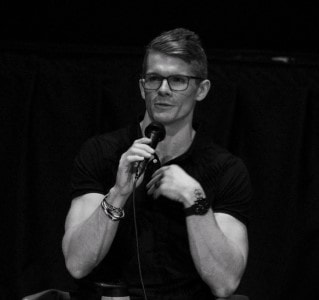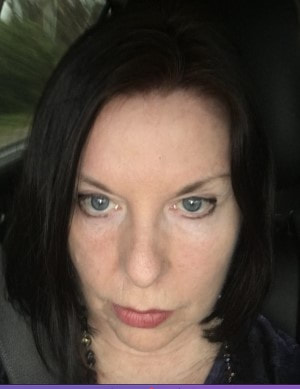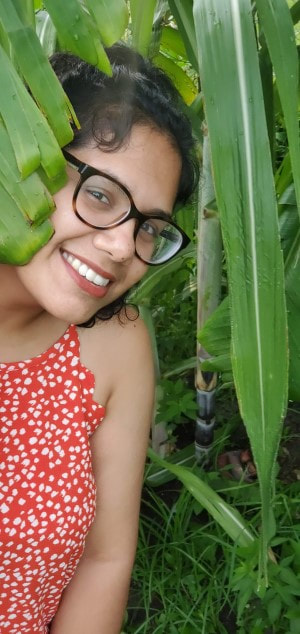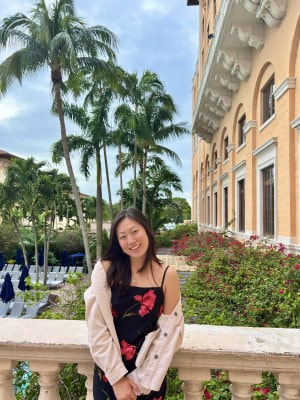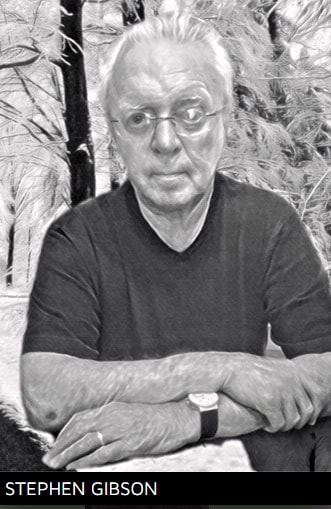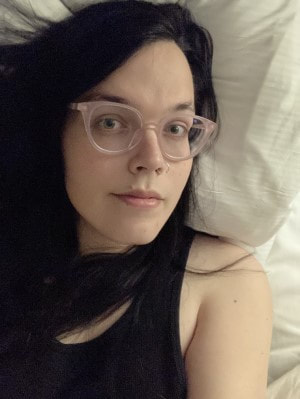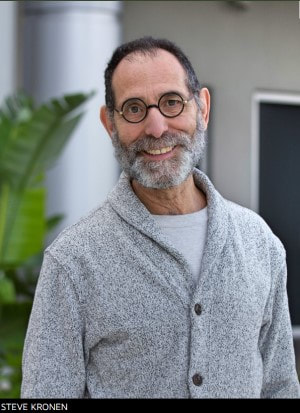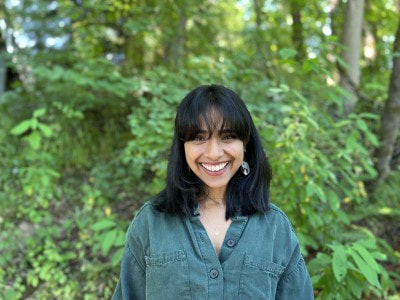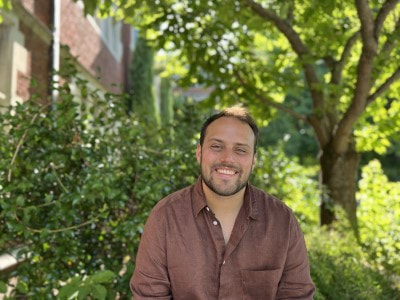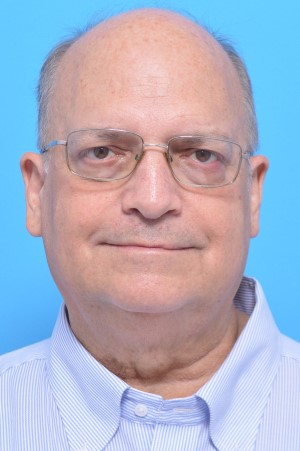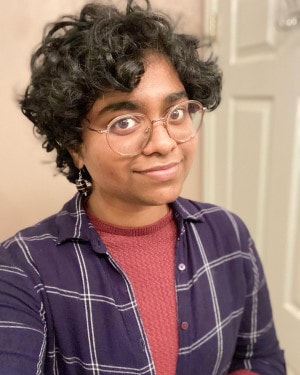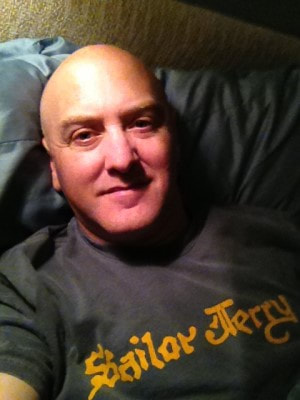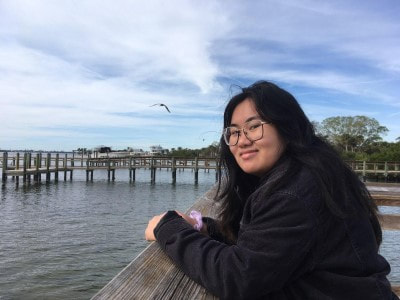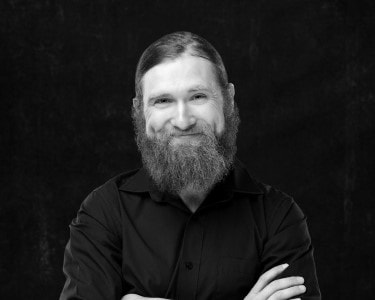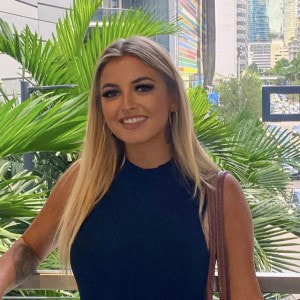SoFloPoJo Contents: Home * Essays * Interviews * Reviews * Special * Video * Visual Arts * Archives * Calendar * Masthead * SUBMIT * Tip Jar
Click here to read MAUREEN SEATON'S Works Published in SoFloPoJo since our founding
Scroll down for the poems from The Maureen Seaton Poetry Prize
Click here to read MAUREEN SEATON'S Works Published in SoFloPoJo since our founding
Scroll down for the poems from The Maureen Seaton Poetry Prize
With gratitude to Maureen Seaton for suggesting the prize,
Samuel Ace for the difficult task of judging the submissions,
all our staff and guest submission readers,
the many writers that shared their work,
and you, our faithful readers.
Samuel Ace for the difficult task of judging the submissions,
all our staff and guest submission readers,
the many writers that shared their work,
and you, our faithful readers.
Samuel Ace is a trans/genderqueer poet and sound artist. He is the author most recently of Our Weather Our Sea (Black Radish), Meet Me There: Normal Sex & Home in three days. Don’t wash. (Belladonna* Germinal Texts), and Stealth with poet Maureen Seaton (Chax). Chapbooks include: What started / this mess (above/ground press); Our Weather Our Sea (Belladonna Chaplet #209); Madame Curie’s Notebook (with Maureen Seaton, Artefakta); Triple # 11: The Road to the Multiverse; and Triple #18: A minor history / of secret knowledge (with Maureen Seaton, Ravenna Press). Ace is the recipient of the Astraea Lesbian Writer Award and the Firecracker Alternative Book Award in Poetry, as well as a repeat finalist for both the Lambda Literary Award and the National Poetry Series. Recent work can be found in ex-Puritan, Poetry, We Want it All: An Anthology of Radical Trans Poetry; Home is Where You Queer Your Heart, PEN America, Best American Experimental Poetry, Baest, and many other journals and anthologies. A book-length poetic essay, I Want to Start by Saying, is forthcoming from the Cleveland State University Poetry Center in 2024. Also forthcoming in 2024: Portals (Ravenna Press), a hybrid work co-authored with Maureen Seaton.
Denise Duhamel, Jessica Argyle, Amelia Badri, Camila Cepero, Caterina Dong, Stephen Gibson, Rose Jenny, Jen Karetnick, Steve Kronen, Carolene Kurien & Jarrett Moseley, Mia Leonin, David Lohrey, Allen Means, E. R., Swetha S, Gregg Shapiro, Para Vadhahong, Ana Valdarrama Lemus, Elise Vincent, Brendan Walsh, Evan Wambeke, Madison Whatley
Denise Duhamel
Editor's note: Denise asked to include a Maureen tribute poem that would not be considered for the prize. Could we say anything but yes? (Of course, we said yes.)
|
Denise Duhamel’s most recent books of poetry are Second Story (Pittsburgh, 2021) and Scald (2017). Blowout (2013) was a finalist for the National Book Critics Circle Award. She is a distinguished university professor in the MFA program at Florida International University in Miami. |
POEM IN WHICH I NO LONGER WITHHOLD THE FACT
I saw Maureen’s profile in the dawn clouds a few days after her death. I wondered if anyone would believe me. I wasn’t ready yet to talk about it. Haunt me, I said to the sky, like a child speaking to her imaginary friend. Maureen was my real friend who practiced therapeutic touch right through the phone. If anyone could come back as a friendly ghost it would be her. It’s not fair to look to the newly dead for answers, to ask them for the next line of a new poem. Maureen surely needed her rest. She threw her head back. She was laughing, I think, or contemplating seriously cirrus thoughts before breaking apart. |
Ana Valdarrama Lemus - Winner of the First Annual South Florida Maureen Seaton Poetry Prize as selected by Samuel Ace
Palm Beach County, FL
Palm Beach County, FL
Judge's comments: I kept coming back to these poems. The energy and sheer force of the language drew me in every time I read them.
The voice is raw, but never loses its music from the opening lines to the end. - Samuel Ace
|
To view the pdf of Ana Valdarrama Lemus's poems
click on Download File >>>>> |
| ||
|
Clase tipo subnormal
I lie under a willow tree and grassroots, circuit growth of your I don’t know’s and Later’s, I hate to compromise myself for you but even I can see it's needed if we gon’ run this, look me in the eyes and tell me you don’t know about that sacrifice cause you’re used to shitting answers to questions nobody asked, somebody tell Jesus we found the real Messiah cause you too holy to let us forget it. Tell me I ain’t crazy cause I might be losing it, mumbling to myself notes I never wrote down for a meeting you held in my absence. Lord, let me go a day without no fighting, yelling at my rearview mirror like it’ll talk back, picturing somebody else’s face when I’m screaming at a car that ain’t come near me, Amadeus, name me a symphony -- No. 5 for nobody cares and a band that doesn’t play music. I’m learning to like songs without the words, just a violin concerto and some piss-drunk maestro they got off Craigslist, man, you gotta kill me, cause I’ll die before I sing a Goddamn note, I know I said so, made some New Year’s Resolution I’d be a Saint, God, You best send me to Heaven after the year I’ve had, playing the same vinyl I broke on repeat ‘till I got used to it, read an article that we become attached to shit we hate if we hate it long enough, and I swear I’ll never lie again if You give me an angel. Flying’s got me turned up but I’ll jump off a cliff if it gets me out. Had a dream I almost sank, but I held the ship up, don’t put me in no ocean cause I don’t care enough to swim: These folk will treat me like a lifeboat and leave me out for sharks, I saw the movie Jaws and it looked awfully real on screen. You already testing me like a Prophet with a cross nobody’s gonna help lift, martyrdom might be Your thing but it ain’t mine, death’s really just a punchline to a joke I told before, I’m not tryna be funny, but I know how this one ends, I got table manners that don’t matter when the silverware is gone. You call my tone disrespectful or make a comment ‘bout my lawn, so cut the Goddamn roots if you’re so helpful and get the hell out of my yard. Shit, I signed a warrant, but I can’t pay for my own arrest. Don’t get mad, I can’t even complain cause I dug a grave under my own feet and let myself die, I don’t get paid for the work you frame on your walls, I gotta sue. Hold up a blank document in court and spit on it, that’s how much would get done without me, write your songs on napkins and keep ‘em in your pockets, ain’t nobody listening to Amadeus these days, so choke on it. Vertical Divider
|
Encerrada en el retrato
I hate museums, or I hate the way I need them, online galleries not enough to satisfy the desire to gaze at someone else’s art, eyes roaming a prepaid, beautified corporate nightmare. The art’s edges frayed, passed from frame to wall across ten museums, the hellish inner circle of an industry we know exists but ignore, workers pointing at No Photography signs nearly tackling an elderly man trying to get a picture of an ornate table. I hate the commodification of art. There is no such thing as public domain, I cannot slide the picture from its case, take it like a token. It’s an unfree, undemocratic, perfectly human institution: ownership both collective and individual. We do not own the rights to art, yet we the viewers are more than spectators, and a creator exists only within the fabric of their own creation -- once it’s varnished, packaged, placed behind a golden frame on white plaster, it becomes an us, but not a we. We do not believe in sharing, but it still belongs to us, propertized free market feeder worms feasting on corpses of what might have been art Dos patrias tengo yo
1° Pseudo-scientific Stockholm Syndrome-type love, I seen it in the articles my father pretends to care about, I know it’s hard to picture, but I’ve lived it: hate the land that raised you cause He let you go like you was made of asphalt, love a place you wanna hate cause you don’t know how to, capitalist-hellscapes don’t seem so bad when you’re not the one exploited, I learned that one when I showed off my all-American teeth to my ESL teacher. Patriotism got me singing Ol’ Yeller like an anthem, get me rootbeer and a flag, I’ll pop a squat in this cemetery, just close my eyes for me, don’t see why I can’t walk blind if y’all do, get your groceries and pack it up, we’re skipping town, road trip through somebody’s land, we real movie stars in one of those James Dean pictures, put me in black and white, and get off the screen, hypocrite, we singing some industry plant 2000s pop before the hurricane blows our heads off, I got nine minutes to live and you ain’t worth one. 2° Muy original, la chamba, como canta esa niña el himno nacional — ¿explícame qué quiere decir patria? No es querer muerte ni sangre, pero amar la patria como el aire, quiero ver la lluvia desde el techo de la iglesia, lávame el alma que me siento sucia, ahogame que si tengo que morir será por tus manos, Dios, no entiendo como se puede vivir así. Ain’t no Western film decoration pistols on mantelpieces next to deer heads, this the real thing, no article’s gonna make you feel sympathy you ain’t felt before, stop thinking about theory and see it in practice: Ven a ver la sangre por las calles, no storm’s gonna wash the blood off your hands, look around. Life is primitive cause you made it that way, this used to be something. Always stealing shit and pointing fingers, got your name written on more funeral notices than not, talking about some some good ol’ country loving that comes with a shotgun to the head. Can’t forget about no crimes on a road trip cause where we driving when you burned the damn car? Always picking up after you, I’m sick of it, that’s why Hell is full. You don’t deserve to kill this place even though I want it dead, that’s some corpses I’m never gonna stop hearing above your screaming, I rather die first if it means I’ll haunt your children long enough for them to feel some sort of shame |
Ana Valdarrama Lemus is a senior at A.W. Dreyfoos School of the Arts majoring in communications arts.
Honorable Mentions from the First Annual South Florida Maureen Seaton Poetry Prize as selected by Samuel Ace
Allen Means, Jen Karetnick, Brendan Walsh
Allen Means, Jen Karetnick, Brendan Walsh
Allen Means - Honorable Mention from the First Annual South Florida Maureen Seaton Poetry Prize as selected by Samuel Ace
Miami-Dade County, FL
Miami-Dade County, FL
|
To view the pdf of "QUEERS <3 SUFJAN STEVENS" & "queer imaginary"
click on Download File >>>>>> |
| ||
|
QUEERS <3 SUFJAN STEVENS
for B. & b. & . =-=-=-=-=-=-=-=-=-=-=-=-=-=-=-=-=-=-=-=-=-=-=-=-=-=-=-=-=-=-=-=-=-=-=-=-=-=-=-=> twice you call the moon a halo over my head once straddling your lap the other with your head in mine looking up at me from the ground an angel you call me and it’s hard to imagine death like that a companion or consolation effortless untethering just an image suspended by your naming of the thing thrown up into the sky (fly!) just a metaphor and it’s not about the wings it’s not their lightness or darkness lent to me pulled up on the shoulders it’s something else like falling from an uneven surface more human than angel if anything a bird some comfort sang like this a bird a bird i keep finding these nests i’ve built in my sleep from when we pick each other of fabric of feathers memory like how i keep giving up the full sofa for a loveseat both curbside disposal sweet and impractical in my very first apartment in my second a scrappy green cushion tufts of gray historic cat scratches yellow eyes gashes i sewed shut in the living room just a bit too small perched (how i like it) bony shins and thighs coupled in my hands shaking as i paint your nails black i should mention that this next part was written six months ago when the world was [ ] that i stuffed it away thought too sentimental but here’s the rest of it i tell you i don’t listen to lyrics for the first time while we are discussing Sufjan Stevens and you accuse me of not knowing why “Fourth of July” is so sad as soon as you say this i recall death i recall taking your hand onto my lap i play it for the first time in many years listen to each word the whole way through the thing is you don’t have to memorize memories you just recall them i know this song is about [ ] before we say goodbye i should mention we don’t say this next part aloud (you’ve told me now that you think grief in poetry is overdone but i hope you can understand this— i’m making space instead) sliding closer distinctly human feelings with names like ours and it is like that that we are suddenly [ ] all our lost friends woven in our pull towards sad music you point to a book on the table Did you like it? I knew him. i touch the back of the loveseat your shoulder a wing sometimes when you talk i never tell you this in halos (like them) this is why you watch documentaries you inform me because the connection built via horror and sympathy overtakes you and there is a vulnerability so holy (can you use the word Holy like this? i mean i want awfully delicate i mean i want to share this i mean i want to bless you i mean everything in our reach ghosts) pulsing in our awkwardly entangled hands both with a strange desire to be devastated the ends of our limbs extremities of one another and it is this song that makes me think i’ll make one about us not like lovers (or maybe i would like to call us, all of us, that: Lovers. yes. i’ll make like someone makes a friend if you’d like to. can i hold you, like this?) knee against knee foot against foot and it’s here where i begin to imagine one of yours humorously amongst all the [ ] like bird’s feet clawed prehistoric horribly ugly to me at least but in that second charming as i press the sole of my foot against it the thought pleasing my lack of a clear picture of a somehow bird-human with ankles coned enough to become bird feet or bird feet thick enough to sustain ankles but with no other discernable bird features your chirpish sound kissing at my ear displeased at my pausing of the music an action i didn’t even notice i had made (to hold the moment maybe my image of them hinging on escape) as you take the phone from me and hit the next track returning the motion to press your (yes, now very human) feet like the whole damn earth against mine. Vertical Divider
|
queer imaginary
i queer my body at the edge of town stripping on the metro & taking pictures in the glossy blur of the window capturing movement & empty seats in the photos i crowd myself with image with looking on the outside i am every angle every color of the sky public in the way that the sky is public rearranging myself kissing the metal poles swinging sprawling across the seats sometimes with my eyes closed sometimes with my eyes open & it feels so good the metro car pushing & pushing the world away so it cannot catch me taking myself in making love this way & it’s always about sex but what about just a body in its bigness in its aliveness in its own display of tether -ed to the world a grounding the hands not for touching but for feeling holding weight “the body” not an image nor an architecture a warm capsule within & in & in i’d like to give back to it instead of take but of course that’s making love too & I am right alongside the deep silver whir of the AC its coolness the shh shh of the tracks & i am opening [here] on the inside because the camera cannot capture this kind of private machine how it works it can only capture my shoulders how they can shed a coat of baby blue feathers & shiny teal fabric so thick it builds a beautiful human-sized nest for me to dip down & dream in. |
Allen Means is a queer poet from Boulder, Colorado. He currently resides in Miami, Florida, where he collects love and language, among other things. His work appears in Chaotic Merge, Voicemail Poems, and Nimrod International.
Jen Karetnick - Honorable Mention from the First Annual South Florida Maureen Seaton Poetry Prize as selected by Samuel Ace
Miami-Dade County, FL
Miami-Dade County, FL
|
To view the pdf of Jen Karetnick's poems
click on Download File >>>>> |
| ||
|
The Making of What’s Left
Now that he is losing it those handfuls of fine strands in his palm like pocket lint my son asks me to teach him to style his hair how to use a brush to straighten the curls instead of flattening them like the rounds of dough he learned to fry with scallions while traveling in Asia Now that he’s losing it the five-year girlfriend gone as if she had never been four-year college done the two-year job in Austin to begin the dermatologist not only confirming that the fine strands in his palm like pocket lint is male pattern balding but that tests have also revealed that autoimmune disease lies in wait as it did for me at that age my son asks me teach me to style the cowlicks that warp his part comma his forehead the way my older brother’s did who is forever younger than me now his hair a brush that grows straight into earth My brother was my son’s godfather but even that didn’t heal what was wrong between us We were too much alike from the hair that needed brushes to straighten to the co-morbidities we both had to track like animal scat through our blood My son holds the hairdryer as if it is his ex-girlfriend I teach him to style from a left part the same side from where his kidney will be taken for his childhood friend undergoing dialysis, the fine strands in his body filtered as if for lint three times every week Universal donor my son is scanned probed screened finding out how to value his imperfect body now that he is giving away a handful of it *The title comes from a line in the novel, The Music Lesson, by Katharine Weber Vertical Divider
|
Birds with Eponyms
will no longer have to bear them: eighty men who called the winged and feathered after men Townsend’s warbler Townsend’s solitaire who collected Native skulls to prove them inferior, labeled them less than human, Wallace’s standardwing Wallace’s fairywren who peppered research with slurs like season- ing, who feared diseases of foreign women, Bachman’s sparrow Bachman’s warbler who will be dropped like the parasites birds preen onto the monuments of Confederate men Steller’s jay Steller’s sea eagle that will also be removed and the mountains that are also peaks to be renamed in place of men Swainson’s thrush Swainson’s toucan who raped and pillaged and colonized, been enslavers or returned slaves to the white men Audubon’s shearwater Audubon’s oriole who claimed to own them on land overseen by more species than there could ever be of men. |
The winner of the 2022 Cider Press Review Book Award for Inheritance with a High Error Rate (January 2024), selected by Lauren Camp, Jen Karetnick is the author of 10 additional poetry collections, including the chapbook What Forges Us Steel: The Judge Judy Poems (Alternating Current Press, summer 2024). Her work has won the Tiferet Writing Contest for Poetry, Split Rock Review Chapbook Competition, Hart Crane Memorial Prize, and Anna Davidson Rosenberg Prize, among other honors, and received support from the Vermont Studio Center, Wildacres Retreat, Mother's Milk Artist Residency, Centrum, Artists in Residence in the Everglades, and elsewhere. The co-founder and managing editor of SWWIM Every Day, she has recent or forthcoming work in The American Poetry Review, Atlanta Review, Bellevue Literary Review, Cimarron Review, Cold Mountain Review, Harpur Palate, Missouri Review Poem of the Week, Notre Dame Review, Plume, Shenandoah, South Dakota Review, and Tar River Poetry. See jkaretnick.com.
Brendan Walsh - Honorable Mention from the First Annual South Florida Maureen Seaton Poetry Prize as selected by Samuel Ace
Broward County, FL
Broward County, FL
|
To view the pdf of Brendan Walsh's poems
click on Download File >>>>> |
| ||
|
least bittern
you spot it first, a least bittern piercing through the swamp’s edge, slightly larger than a robin, a pin-beak designed for the quick kill. a heron of diminutive stature. black-mohawk, forest-floor plumage. i’ve never seen one before, but i’ve been good today, identifying the great egrets, wood storks, a night heron which was certainly a night heron despite the insistent eyes of another birder who called it a limpkin. not even close. there was the roseate spoonbill, more pale than bright pink, a great blue heron on a pond apple island, the tricolored herons fishing by the monster gator laid out across the walking trail, and the glossy ibis, iridescent and proud to be such a remarkable ibis, of course anhingas splaying wet wings in the sun, of course common gallinules which i called moorhens, their closest cousins, and a pair of black-bellied whistling ducks pretty as paintings you’d find in a hunter’s cabin. we don’t stop talking all day, old friend, like the wood storks honking in their nests. |
there is an aldabra giant tortoise named jonathan who is 190 years old. jonathan lives in the british territory of st. helena in the south atlantic which was once a place where napoleon lived and died in exile, but is now a place where jonathan, the oldest known living animal on the planet, lives. there is a photo of jonathan from 1886. you can google it right now. jonathan has lived so long that cataracts have clouded his eyes, his sense of smell disappeared years ago. he won’t leave his mate’s side, though, whose name is fredrik, aged 32, who was once thought to be federica until researchers confirmed his sex. jonathan’s other mate, emily, is in her fifties. he loves according to how a mate’s shell feels against his. other petty things don’t matter, he has decided, as old folks often do. jonathan’s many lovers have lived and died while we built cities, razed them, erected skyscrapers, threw children into cold streets. this isn’t a poem about age or jonathan’s memory, which goes back farther than most nation states. i just wanted to let you know that a two-century old pansexual tortoise named jonathan is still alive somewhere on this same planet, where we toil for a little bit of time. i thought this might help make sense of things. i thought it might make you smile last summer
you’re shaken only in private when you learn your mother dies, seven thousand miles away. at night, you retreat to the bedroom to cry. in the morning, you pretend the coffee’s sweet enough, the birds loud enough. i begin to notice eurasian collared doves in the bright spaces of afternoons. i just learned their name so i see them everywhere, their black bowtie half-wrapped around the neck. i don’t know how to wring sense from the muddy cloth of our lives. they should have been mourning doves dotting the telephone poles and poinciana limbs outside the condo, they could’ve cooed at golden hour to let you know there’s some meaning to it, this hurt. sometimes when i open the bedroom door, the doves gone to sleep, the owls somewhere else, you let me rub your back. |
Brendan Walsh has lived and taught in South Korea, Laos, and South Florida. His work has appeared in Rattle, Maine Review, The American Journal of Poetry, and other journals. He is the author of six collections of poetry, including concussion fragment, winner of the 2022 Florida Book Award Gold Medal. He is co-host of the Fat Guy, Jacked Guy podcast with Stef Rubino, and you can find him online at brendanwalshpoetry.com.
author's note: I am proud to submit these poems for the Maureen Seaton Poetry Prize. Maureen was always so generous to me and every other poet/person she interacted with. I hope that I captured a fraction of her ethos in one of these poems.
author's note: I am proud to submit these poems for the Maureen Seaton Poetry Prize. Maureen was always so generous to me and every other poet/person she interacted with. I hope that I captured a fraction of her ethos in one of these poems.
Click here to read words by MAUREEN SEATON published in SoFloPoJo between 2016 and 2023
Thank you to everyone that submitted their work to The First Annual South Florida Maureen Seaton Poetry Prize.
We hope you enjoy reading a sampler of the submissions that agreed to publication below.
Thank you to everyone that submitted their work to The First Annual South Florida Maureen Seaton Poetry Prize.
We hope you enjoy reading a sampler of the submissions that agreed to publication below.
Jessica Argyle Monroe County, FL
|
Isolating Venus 2
My left pinky went first. We were at a restaurant when it began As I spoke my ring finger went poof The thing is, I still see it but you can’t I want you to know I have no interest in becoming a metaphor Even in school I preferred similes I smile but it comes out weird like terror You rise and exit without paying the bill not even a tip when I try to explain, the waitress looks right through me and I notice the rest of me is gone There are benefits of course I hear what they really think about me or each other to someone else You cannot imagine How tired I am How lonely to be the space under the door, above the floor I stay in the abandoned cabin on our property now sold For a fortune, I know Just this morning I caught a glimpse of a dark bird still, hidden in hollow stalks of autumn grass my shoulder tenses a tiny palpating fissure of pain which gives me hope The bird stares upward as if waiting for something I place it where it will be seen or devoured desired by something Vertical Divider
|
The Unmaking of America
The cradle revolted against my growing form and my father said Let’s fashion it into a club, our tears like acid, That’s what tears are for He hammered hobnails onto my tiny boots in the bomb shelter showing me how to work the trapdoor I thought of how old-fashioned the hobnails seemed (even at that tender age, I knew) He read my mind old ways are best, he said. And furthermore Spiraling seeds contain poison if you know where to look And I wondered what else but said nothing I was so small, a mere parenthesis of thought for his knowledge to drop The seeds made trees made seeds made trees I knew that much for sure look up too long and something will shit in your eye he said Nose to the grindstone, this will all be yours some day (The stump, the hole the man turned to clay) He said with infinite patience and love Polishing dark metal living by subtraction an accumulation of minutes spent Wandering empty streets at night looking for a fight Then, gone
The rains came again today and at first I watched the earth resist and water gather like beads of mercury on hardpan. Great pools formed over crusts of soil, parched until it finally gave way. Now, saturated, the slightest pressure from a toe will make it weep. Our feet, morph from clammy to warm, and we hold hands softly, breath thick in thick air. I see myself in a leaf, mascara pooled under my eyes and feel like a traveler in some jungle. And when I see your shining eyes afraid to look I know that you are with me, moving through the tangle. All the monthlong I prepare, the sensual tradeoffs the ritual of readiness, stretching straining every sinew. And sometimes when I eat I can trace a crust of bread as it travels through my body. I hear every nuance, taste salt before it is there. I am old now and you are older but when I move my fingers over the years it is wrong to call me tender, sentimental. Like a deck of cards, a cartoonists trick, I flip them to create a picture of you moving backward in time and I watch the years fall away, the eyes harden mouth set downward in a permanent no. No I prefer the years the softness that time pushes open turns inside out helpless as a mollusk exposed on the beach. Happy I am finally happy that I have been shown for the fraud that I am living on the outside of town on a highway cars pushing their way through my living room. |
Jessica Argyle is a Florida novelist with an MA, Specialty Creative Writing, from Concordia University in Montreal. Originally from Canada, she has made her home in Key West, Florida, since 2009 and writes historical fiction about the Lower Florida Keys. Sidetrack Key, the second novel in her No Name Key series, was released on the last day of 2022. She is currently editing Mangrovia, a standalone novel set in 2011.
Amelia Badri Miami-Dade County, FL
|
Each morning
the Coppertone girl’s innocent face and blonde hair tied with bright blue bows was like a warm and welcoming smile for stressed out commuters, kids who got pinched for not buckling in, for exiles and immigrants to admire. Like Lady Liberty’s little sister that moved down south, took off her winter boots and coat, briefly swapped it for a powder-white robe, traded the rest of her clothes for a black puppy, and jumped straight into the water. Swimming with nothing but her smallest bathing suit bottom, not caring if she should cover up, or wash the sand off her bare feet, or protect her curls from the salt and sun, as the passing cars drift off like tiny shells, lost in a sea of horns in her own sunny corner. |
|
Do we really wish they all could be California Girls? They didn’t seem to help much when a Beach Boy drowned off his own sunny shore. There wasn’t a bushy, bushy blonde hairdo babe giving chemo treatments to Carl. Then there’s the defamation claims, alcoholic outbursts, and a father who pulled out a glass eyeball from the socket strung into the family lore…Where were all the Cali girls then? Clutching at their short shorts and puka shell necklaces like pearls? God only knows where we’d be without them. But what do we expect? Songs dedicated to these girls: ones who help you scale and fry fish instead of watching you die mid-swim? Ones that take starfruit juice and sliced mango to the hospital type of girls. Even though they’re not always island girls from Aruba, Jamaica, Bermuda, with no money to take you…anywhere. Girls who work at the port selling overpriced Bahama Mamas with that never-been-on-a-cruise-let-alone-a-yacht-to-Montserat mystique. Maybe just one song for the girls who spend too many years trying to map a way to a made-up oasis from an 80s song. Girls that sit and cry by the shore, waiting for the next Beach Boy who’ll sail off to fantasy. The girls who just may call it quits for any chance to escape and watch Florida fade away into the dying sea. To get to Kokomo, get there fast, take a drink or two, and take things slow, bodied deep in the sand… |
Amelia Badri is a Guyanese-American poet, teacher, and mother to a beautiful six-year old. She is currently in the Creative Writing program at FIU. She lives in Miami Gardens where she enjoys planting fruit trees and flowers and watching manatees swim in the canal behind her house.
Camila Cepero Miami-Dade County, FL
3 Pieces
Piece #1:
Everything was wet tar all the time.
It was sticky and elastic and black,
and descended upon the host’s life.
In early November, life was typical.
As a matter of trivia, this was ok.
By mid-November, everything was shrouded in a veil of despair.
This was not ok.
Fear gripped the host, and they began to reflect.
They settled into their comfortable couch, in their cozy home,
in the upscale neighborhood of their metropolitan city,
with a mug of hot coffee and no worries to speak of,
except the importance of themselves.
The following is a re-telling of everything that had gone wrong in those few weeks,
and all the reasons the host was allowed to be sad.
Oh well,
nevermind, nevermind.
Piece #2:
As part of my short time on earth,
and in the even shorter time frame which is the life I’ve lived,
I have met everyone I wanted to meet.
I have done everything I wanted to do.
I have seen every sight I wanted to see.
I have lived everything I wanted to live.
The petulant driver in the car behind me honks his horn.
The street light has turned green,
and my commute to the ugly grey building,
where I sit in an ugly grey office,
surrounded by ugly grey people,
carries on.
Piece #3:
I’m in a bookstore in Los Angeles that smells like it’s above my tax bracket,
in the middle of a day in the middle of a week,
and I’m on the phone with a friend, who has grown tired of my unemployment.
I ask the sales associate for the Wilde’s and the Kafka’s,
because I like Kafka.
And Wilde just seems like something I should have read by now.
Secretly, I’m in here searching for the meaning of life.
But I’m really not that dedicated, as the idea occurred to me in the last hour,
and I think I’ll just give up if I don’t find it in the next one.
The only thing I know is,
I’m definitely not reading Nietzsche.
Piece #1:
Everything was wet tar all the time.
It was sticky and elastic and black,
and descended upon the host’s life.
In early November, life was typical.
As a matter of trivia, this was ok.
By mid-November, everything was shrouded in a veil of despair.
This was not ok.
Fear gripped the host, and they began to reflect.
They settled into their comfortable couch, in their cozy home,
in the upscale neighborhood of their metropolitan city,
with a mug of hot coffee and no worries to speak of,
except the importance of themselves.
The following is a re-telling of everything that had gone wrong in those few weeks,
and all the reasons the host was allowed to be sad.
Oh well,
nevermind, nevermind.
Piece #2:
As part of my short time on earth,
and in the even shorter time frame which is the life I’ve lived,
I have met everyone I wanted to meet.
I have done everything I wanted to do.
I have seen every sight I wanted to see.
I have lived everything I wanted to live.
The petulant driver in the car behind me honks his horn.
The street light has turned green,
and my commute to the ugly grey building,
where I sit in an ugly grey office,
surrounded by ugly grey people,
carries on.
Piece #3:
I’m in a bookstore in Los Angeles that smells like it’s above my tax bracket,
in the middle of a day in the middle of a week,
and I’m on the phone with a friend, who has grown tired of my unemployment.
I ask the sales associate for the Wilde’s and the Kafka’s,
because I like Kafka.
And Wilde just seems like something I should have read by now.
Secretly, I’m in here searching for the meaning of life.
But I’m really not that dedicated, as the idea occurred to me in the last hour,
and I think I’ll just give up if I don’t find it in the next one.
The only thing I know is,
I’m definitely not reading Nietzsche.
Camila Cepero is a professional functioning adult impersonator. She was proudly born, raised, and will surely die in Miami, FL. She is the daughter of Cuban immigrants, a badge which she wears with the utmost honor at all times. She's entirely talentless, but nonetheless grew up attending prestigious art schools and studying visual arts, with most of her love being focused on photography. The jury is still out on whether she is legitimately a gifted writer - as she has been told time and again by everyone who does and doesn't matter - or if everyone else is just very bad at it. Here goes nothing.
Caterina Dong Miami-Dade County, FL
|
I want the world to burn for those who couldn’t burn it themselves. I am back in my mother’s hometown. My grief isn’t my own; the world’s is. There are still buildings here, in fact, more than last time when I visited. There is no more middle school, old village, dirt-sanded path. But there is still the massive barrels of corn, the braids of wheat, the lone dog barking into the night. Everyone deserves a hometown they can return to. At twenty-one, I finally understand what childish innocence failed to. The braised fish becomes alive in my stomach. Everything in this world moves in resistance, in unison, against occupation. I was able to honor my grandparents’ this morning. At their grave, I burned paper, fruit, and the cruelty of the world that took them from me before I could know them. What’s the name for cruelty that doesn’t even let you mourn, that bombs hospitals, sends airstrikes, cuts power, in mourning’s place? There is no word. There is only burning. I want to set the world on fire. I want every martyr in Gaza, the West Bank, and beyond back in their homes. I do not get to go home when other people are taken from theirs. All the fresh corn and picked apples in our yard, but not enough people to eat it. We set our offerings on fire. Today, tomorrow, and forever onward, I offer the world. |
What is more dangerous than hope?
Perhaps the salted desperation cushioning my convex spine. I always feel so alone, as though I don’t have two hands for a reason. One to hold me together, another to hold everyone else around me back. I am all the things I could not protect. My little sister’s face turns inside out like a puppet you can no longer contort. When she strangles herself onto my leg, I taste her burnt tears dripped across the shining cutlery. A childhood is something you can remember if you dig hard enough. I think without one but sometimes it would be nice to have something to talk about at a dinner table. I’m hopeful for the life I never had. Never the thing myself I could have, spread, enjoy. Please may you pass the butter. Something to make swallowing easier, like holding my own hand or covering her ears or placing the knife down so I can prove I can hold something without ruining it. Back In Longkou(龙口) In these fields, I finally understand. I walked down this street every morning, my mother points, to my school back there. There’s still corn stuck in her teeth. I imagine myself in her place. Shoes born from old cloth stitched closely together, made only once a year, worn every day. The miles trek across endless dirt-grass, how we come from this land and to it we give ourselves daily. It’s never too late to create a memory, but what about a childhood? I tell myself there’s still time but so many people are gone, and even more are going. When they ask me to give a toast in Mandarin, I give my glass up to the empty air. There is no word for the in-between home, half-leaving, half-already-gone. I sob uncontrollably at my grandparent’s grave. Ashes strewn everywhere, fire still alive on our noses, tears flailed across our ripe faces. My mother bows herself onto the dirt. How we come from this land and to it we must return. A lifetime ago, my grandfather built their childhood home by hand, and it will stand for a lifetime more. This is what living is. A lifetime of building, making something from this otherwise grass, making everything from the otherwise. And afterwards, a lifetime of remembering otherwise. |
Caterina Dong is a poet, student, and teacher-in-blooming. She has been recognized by the National Scholastic Art & Writing Awards, the Austin International Poetry Festival, and American High School Poets. Her work has been featured in VISIONS, Plexus, and Elysium Magazine. At Brown University, Caterina performs spoken poetry among other poets of color through WORD! Performance Poetry and has worked with unhoused people to publish their poems through Street Sights. From experimenting with different forms of poetry to food combinations around peanut butter, she seeks to explore the corners of life and beyond.
Stephen Gibson Palm Beach County, FL
|
Irish-American Saint Patrick’s Day Ghazal
Eyes oscillating like tines on a tuning fork: how they compared her. Doctors said the TIA “episodes” would pass. I was scared for her. My mother said she wanted to explain choices she’d made in life. She said, Just listen, that her liver cancer diagnosis had prepared her. Her father, she said, from County Limerick, never wanted daughters, wanted her to work and her sister to go to relatives, who shared her. Her father, she said, brought everyone over, but was a hard man-- she once saw her mother on the window ledge: her father dared her. Her father was seeing someone else as her mother lay dying in bed: he told his daughter, staring at her mom, he had once cared for her. My mom said when her father found out she was dating my father, whose family were Ulster Protestant, her Catholic father glared at her. My father was in City College of New York; she, in infant nursing care. Pearl Harbor happened, my father got drafted, God hadn’t spared her. Of their wedding photo, the only one of him in uniform, on my wall, she said she couldn’t believe how unprepared they were, him and her. On his grave is Tank Destroyer. He fought Nazis. After, he had electroshock. She said his violence against us was because of the war, but he cared, like her. S, what does this have to do with Saint Patrick’s Day or being Irish-American? I see shamrock glitter on a young girl’s cheek and stare, thinking of her. Vertical Divider
|
A Kobayakawa Kiyoshi Print at the Japan Art Deco Exhibit (1929-1945)
—Delray Beach, Fl. In “Curved Line of the Instant,” his dancer’s left pinky toe sticks out of her red shoe as the young woman is dancing, and you think, from her not looking, that she doesn’t know, or if she does know, it doesn’t matter, because, even though it was clearly an accident, not planned, it’s now something that’s part of her dance. Be in the present, go with the flow, it’s part of your beautiful moment, is what Kiyoshi is saying, in effect, in 1936 what he told his audience in Toledo, Ohio, at an exhibition of his work: life happens, it all has meaning, and it can be as insignificant as his dancer’s curved pinky toe sticking out of her left red shoe in the middle of her dancing to become part of her beautiful moment. He couldn’t know Japan would invade China a year later. In The Rape of Nanking by Iris Chang, young women are buried alive. There are photos. Portrait of Estelle Musson Degas for Sale on Etsy
Paris Communards shot hostages (one drowned, his neck in a noose when thrown into the Seine), including the Archbishop of Paris who’s gowned in his official robes, and, to inflict still more pain, executed his personal attendant; then, the bound priests forced to watch were shot, again and again one after another like putting injured horses down. Communard civilian revolutionaries, held in disdain by the French Army, were shot en masse, thousands, (5000-7000, in May’s last “bloody week,” la semaine sanglante). Degas had fled to his mother’s hometown, New Orleans: this is his brother’s blind wife, Estelle, who is arranging a vase of flowers by smell and feel. |
Stephen Gibson is the author of eight poetry collections: Frida Kahlo in Fort Lauderdale (finalist, Able Muse Press book prize competition, forthcoming); Self-Portrait in a Door-Length Mirror (2017 - Miller Williams Prize winner, University of Arkansas Press); The Garden of Earthly Delights Book of Ghazals (Texas Review Press); Rorschach Art Too (2014 - Donald Justice Prize winner, Story Line Press; 2021 - Story Line Press Legacy Title, Red Hen Press), Paradise (Miller Williams prize finalist, University of Arkansas Press), Frescoes (Lost Horse Press book prize), Masaccio’s Expulsion (MARGIE/IntuiT House book prize), and Rorschach Art (Red Hen Press).
Rose Jenny Miami-Dade County, FL
|
A Suicide in Gethsemane
I will kill the man in me. For now, I wash His feet, scrub the callouses, pull out the fungi between toenail and cuticle. He will be clean when I bury Him beneath Grandfather Mountain overlooking our hometown. He will bathe in Piedmont Creek, still filled with crawdads and toy boats, the ones neighborhood boys would race all May, palms catching algae that sneaks through their spread fingers. When I murder Him, turn Him over for the fist full of silver promised me, one for every day in April, I will go on a shopping spree, buy every summer dress, the ones with interlocking sunflowers I passed by as a child, afraid, like I was allergic to anything too soft to touch, too delicate to hold. I will wear that dress the day after I hand over the man in me, naked, sopping, afraid. He already knows what’s coming; I leave Him threats, mementos from when we were unconscious: oversized black hoodies, gloves worn out around the knuckles, and a pair of unworn kitten heels. They are gathered in a cardboard box on the side of Lightwood Drive with the rest of the garbage. Vertical Divider
|
After Pride
The abrasion from your rainbow striped sports bra marks my back in a nervous strip; fading gingko leaves crawl across our window. Mid-morning rainwater refracts the faded outline of our rainbow windchimes in the sill, afterglow of a downpour. An asthma attack is your new tick. Steeping gingko in your teacup, our fixed tableau is outlined by the entire zodiac. Arching over us, stellar rainbows map out our tangled torsos wrapped in this bedding, lilac scented, sheets tinted gingko green. We’ll sleep in Buffalo tomorrow. Today we’ll pack party favors made of rainbows, sipping memory-saving gingko. Director’s Notes for Melchior in Drag
Blend into the feminine in a vermillion maternity dress brushing your skin to the point of abrasion. Even as wiry chest hair plumes, the persuasion of a limp wrist doused in apple cider helps in going stealth. Dollhouse etiquette is required; you will only move when I alone desire you to. Mirror Wendla center stage. Kiss her hand, a sweet, Splenda gesture, not quite sugar, but a sapphic substitute. You will stop, look her in the eyes, step away, and play your ukulele. She wants you to stay, to hold longer, to touch deeper, but your song will suffice. So clutch your instrument, steal yourself, split your own virginal seventh seal, and let the Pinter pause speak for itself. Denial will be more plausible. |
Rose Jenny is a trans writer/performer based in Florida. Her work has been published in Santa Fe Writers Project Quarterly, Pensive Journal, new words {press}, The Athena Review, and The Dead Mule School of Southern Literature. She holds a BA in English with a concentration in Creative Writing from University of South Florida. Additionally, she is the recipient of the 2021 Estelle J. Zbar Poetry Award. Rose is pursuing her MFA in Creative Writing at University of Miami.
Steve Kronen Miami-Dade County, FL
Steve Kronen's collections are Empirical Evidence (U of Georgia), Splendor (BOA), and Homage to Mistress Oppenheimer (Eyewear). He lives in South Miami with his wife, novelist Ivonne Lamazares.
Carolene Kurien & Jarrett Moseley Broward County & Miami-Dade County, FL
|
Poem ending with the line “chasing lucid dogs into the disco ball of crying”
It’s like pulling an inchlong sock over your face to understand the holes in what seems to be opaque. Your eyes, for example. And more likely, the sound they make when clamping shut. At the grocery store you said “know that I love you,” and I was upset to know you were talking to the persimmons. You rubbed their soft skin like a bird with a broken wing. I have never wanted to be a sad animal as much as I did then, shouting into the hallway of that memory, waiting for an echo. Where, when, how, why-- doesn’t matter anymore. In the canyon something happened. What was it? We were two red-roped tightwalkers chasing lucid dogs into the disco ball of crying. Vertical Divider
|
The Orb Spectacular and Wanting
The world was short and dying of breath. The leftover mussel of your tongue baking in my throat, your face cemented onto mine like first footprint. The sky a soft man, the birds, the trees’ voice-- I love you more than a peacock loves not to be a cardinal. We take the trash out. We wait for the glory of sawdust glitter on our ill-constructed house. This is a psalm for the whale in your heart. More than you’ll ever know-- I never meant to fall out of love with trying. Tonight the air is unforgiving and my hands are cold. |
Carolene Kurien is a Malayali-American poet from South Florida and a 2024 MacDowell Fellow. She received her MFA from the University of Miami, where she was a James Michener Fellow. A Tin House alum, her poems have been published or are forthcoming in Salt Hill, Redivider, Bennington Review, BOOTH, Bellevue Literary Review, and elsewhere. You can view her work at carolenekurien.com.
Jarrett Moseley is a bisexual poet living in Miami, where he was a James A. Michener fellow in the University of Miami's MFA program. He is the author of the chapbook Gratitude List (forthcoming, Bull City Press, 2024). His poetry has won awards from the Academy of American Poets and the Baltimore Review, earned an honorable mention for the Miami Book Fair’s Emerging Writer Fellowship, and been long listed for the Poetry Society’s 2022 National Poetry Competition. His poems are featured or forthcoming in POETRY Magazine, Poets.org, Baltimore Review, Diode Poetry Journal, and elsewhere.
Jarrett Moseley is a bisexual poet living in Miami, where he was a James A. Michener fellow in the University of Miami's MFA program. He is the author of the chapbook Gratitude List (forthcoming, Bull City Press, 2024). His poetry has won awards from the Academy of American Poets and the Baltimore Review, earned an honorable mention for the Miami Book Fair’s Emerging Writer Fellowship, and been long listed for the Poetry Society’s 2022 National Poetry Competition. His poems are featured or forthcoming in POETRY Magazine, Poets.org, Baltimore Review, Diode Poetry Journal, and elsewhere.
Mia Leonin Miami-Dade County, FL
Self Made
One day I will un-drop the slipper and un-princess
the entrails of happily ever after.
One day, I will castle past mote and huntsman.
I will, in fact, unapple the queen’s hand.
Even the storm her mirror conjures will no longer scare me.
One day, I will land in the witch’s lap, my barometric vulva
pulsating its own weather, whirling past Oz to an emerald present.
One day, I will mount a lusty roan and ride,
my ascending aorta sheathed in high noon and gun smoke.
But the sundown standoff will be with joy.
I will put down my weapons and cajole the idea of her with whiskey. No,
I will unlace my corset, hitch a gartered leg over the pianist’s shoulder and serenade her. No,
I will hop on a stallion as unbroken as a thunderbolt and flee her. No,
I will shoot joy, and with my one-eyed aim, I never miss.
Mia Leonin is the author of four poetry collections: Fable of the Pack-Saddle Child (BkMk Press), Braid, Unraveling the Bed, and Chance Born (Anhinga Press), and a memoir, Havana and Other Missing Fathers (University of Arizona Press). Leonin has published poetry and creative nonfiction in New Letters, Prairie Schooner, Guernica, Indiana Review, Witness, North American Review, and others. She teaches creative writing at the University of Miami in Coral Gables, Florida.
David Lohrey Lee County, FL
|
Operation Constantinople
Frankly, I get a little nervous when poets write about the lusts of snails. It is bad enough having to consider the orgasms of mites. It all seems so melodramatic. I just read an article about panting mosquitoes. I so desperately want to get back to reality. Where is Frederick the Great when you need him? All I ever needed was some black walnut ice cream and grape pop, and a chance to dance the night away at the Mocamba Lounge. It is only there where one can join a conga line and dance around the Tumtum tree. I just need a little more God- water, and I’ll be good to go. I look forward to buttering my toast. That is the extent of my dreams. My friend Horibe taught me to take Japan’s Hope train which everybody knows is faster than Light. I yearn for another pithy takedown published by the US Press, a really good piece of fun summer reading by a Pulitzer-prize winning disruptor. It was all good until I saw my dead father on the express train from Kyoto. That man there, I said to the woman sitting beside me, used to be my father. I recognized the blue-veined arms on the dead body riding the train with us from Shimokitazawa to Chitose-Funabashi. That’s the corpse of my father! I recognized his receding hairline and his pale skin, I cried, still gripping her arm. It even had his curly hair and was wearing his glasses. That’s dad, all right, sitting beneath the sign for special seating. That’s exactly where he’d be if he were still here. He was an emotional cripple, that’s for sure. He flew into rages over nothing. No rest for the wicked, he’d say. Even in retirement, one goes to bed exhausted. We all are required to pump our own gas. The old wander around on the sidewalks in their negligees. They once bought clothes off the rack, but now sift suits off the floor. There is no personnel. They’ve figured out how to serve the masses without clerks. The head of security took me aside. If I were to begin licking now, he promised, I’d be finished by midnight. I’d like the opportunity. Or you could sign up for my monthly special, in which case, I’ll drop by once a week to suck your toes. It’s up to you. It’ll cost you extra if you want me to stick my finger ... The book was dull. I took it with me for a walk. Guys at the station thought I was being a jerk. All I said was it’s hard to read in the dark. I should have gone to "The Edge" or "The Daily Snit," any one of the other sad bars around town, but I wasn't picky. People are so touchy about their looks, especially around a guy with a book. My best friend went into The Windy City, a topless joint in central Manila. She squeezed a lime over her left breast and asked invitingly, “Take suck?” The human condition hasn’t much to do with humans. We are talking survival, not manners; we are looking to hire bouncers, not masseuses. In the Pentagon’s scenario of total destruction, no effort is made to save people. |
David Lohrey was raised in Memphis and is now based in Florida. Lohrey’s work highlights how the absurd and the banal mingle across the terrain of America’s advanced cultural dementia. His first book of poetry, Machiavelli’s Backyard, draws on his experience growing up in the era of Martin Luther King’s killing, Patty Hearst’s kidnapping, and Watergate. His work has appeared or is forthcoming in Cardiff Review, Dreich Quarterly Review, the Delta Review, Dodging the Rain, Expat Press, Southword, and Stony Thursday Anthology. He was a 2020 finalist for LA’s Jack Grapes Poetry Prize. A multiple Pushcart Prize nominee, David saw his second collection, Bluff City, published by Terror House Press.
E.R. Broward County, FL
When I left New York
Too far to measure
the distance between autumn
and tropical islands
where sand will not lie with snow.
Everything is sand
and moist loam. Hand-pried holes
beg for growth, burial, rain
soaked to the limestone. Rain
washing my lungs and dreams.
The air almost solid.
The day we go away my mother
lies, it still snows
vignettes
frozen in the breath
of a steel door
in the grocery store.
It isn’t so hard to avoid
films that start and end with Greenwich Village
books by Patti Smith
everything ends in the Village
in shoulder pads at the Whitney
the Strand
you can’t be Franny Glass.
I’m not impressed you know
how to spell Wojnarowicz
or you saw Machine Girl on a rooftop
in Bushwick. I choose not to believe
you’re family friends with Steve Buscemi
who the fuck
is Machine Girl? Tell me
I don’t want to know
another photo of Dylan
at 20 years old.
Dear Lauderdale
I never gave up on you like I gave up on New York,
how can you be a city and drool in your sleep,
like a child at night
melting underneath
my mother’s palm
holding
my frostbitten mittens
in Rockefeller Center
on Christmas Eve.
I bury my heart in the passage of time,
it never leaves.
Too far to measure
the distance between autumn
and tropical islands
where sand will not lie with snow.
Everything is sand
and moist loam. Hand-pried holes
beg for growth, burial, rain
soaked to the limestone. Rain
washing my lungs and dreams.
The air almost solid.
The day we go away my mother
lies, it still snows
vignettes
frozen in the breath
of a steel door
in the grocery store.
It isn’t so hard to avoid
films that start and end with Greenwich Village
books by Patti Smith
everything ends in the Village
in shoulder pads at the Whitney
the Strand
you can’t be Franny Glass.
I’m not impressed you know
how to spell Wojnarowicz
or you saw Machine Girl on a rooftop
in Bushwick. I choose not to believe
you’re family friends with Steve Buscemi
who the fuck
is Machine Girl? Tell me
I don’t want to know
another photo of Dylan
at 20 years old.
Dear Lauderdale
I never gave up on you like I gave up on New York,
how can you be a city and drool in your sleep,
like a child at night
melting underneath
my mother’s palm
holding
my frostbitten mittens
in Rockefeller Center
on Christmas Eve.
I bury my heart in the passage of time,
it never leaves.
E.R. is a Broward-based resident of over a decade. He is 2020 graduate of the New College of Florida with a bachelor’s in English and an undergraduate thesis. He has self-published a novel (Anatomy of a Butterfly, 2017), and collection of poems and other writings (there are more Important Things at hand, 2020). E.R. has been featured in literary journals such as Sink Hollow, ffraid, and An Inkslinger’s Observance. He likes to think of his writing as living in the convergence of reality and a dreamscape. Otherwise, he tries not to think of his writing that often.
Swetha S Miami-Dade County, FL
|
DEAR AMMA, I have good news. I have found a man for my arrow. We are on the Kanyakumari shore. He looks at my arrow’s point. My bow string is taut in the curl of my finger, at my chin. We’ve been here for six hours. My lemon chilli corn cob has blackened. He rakes his hair with lean fingers, rises with the waves. I quiver with my arrow as he walks to me. He touches my wrist. The arrow pierces him, splatters sand red. He only grunts. He’s a man alright. Amma, I have good news. The man I shot has a car. We are climbing Nilgiris. He’s into Formula One races, has a BE in Mechanical Engineering. He parks only in desolate corners. His tongue curls like the Western Ghats, wrist -watched hand knows how to take mine. When he tugs my hand between tea bushes I know to lean into his kiss. When he tugs my hand on a Kurinji cliff, I know to guide his hand to my thighs. When he tugs me to his chest, I know not to run. Amma, I have good news. Though he is an atheist, we are in Tirupati. I am an emptiness with a jasmine braid, a nothing wrapped in layers of saree. He still finds my hands, the gap that reveals my hip, the deep U-neck on my blouse’s back. Maybe those Ray-Ban aviators and the shadows of the temple spires conspire to out me. But nothing is free. You asked me to shoot a man for living in your womb. He asks me what will I do for him, what will I do for him, what, oh stop giggling, tell him how will I pay for this thiruneer dusted temple visit. So I take his hand in mine. I must thank you. You taught through your wobbling lullabies and leather belt swells that heterosexuality is not knowing when to run. Sincerely, Your daughter. |
Swetha S is a native of Coimbatore, India, living currently in Miami. She is pursuing an MFA in Creative Writing at the University of Miami.
Gregg Shapiro Broward County, FL
|
Winging It
after Carlos Rancaño I wasn’t always an angel. Afraid to fly for as long as memory permits. My feet planted solidly on terra firma. The weight of muscle so great, even standing still was an effort. Hurricane winds caused some agitation, ruffling, flapping to fight the force. Lighting a cigarette, combing my hair, laughing at Mother Nature’s sick sense of humor was as unviable as reasoning with Moms for Liberty. Sometimes I balance on one leg, flamingo-style, fold this plumage into an embrace, a feathered cocoon, vertical sleeping bag, to still my racing heart. Dream of takeoffs and landings, without ever leaving the ground, taking in a bird’s eye view of limbo. |
Gregg Shapiro is the author of nine books including Refrain in Light (Souvenir Spoon Books, 2023). Recent/forthcoming lit-mag publications include Orange Blossom Review, San Pedro River Review, BarBar, Otherwise Engaged, The Penn Review, RFD, Gargoyle, confetti, and BP Review, as well as the anthology Let Me Say This: A Dolly Parton Poetry Anthology (Madville, 2023). An entertainment journalist, whose interviews and reviews run in a variety of regional LGBTQ+ and mainstream publications and websites, Shapiro lives in South Florida with his husband Rick, and their dog Coco.
Para Vadhahong Charlotte County, FL
An Ode to Translated Love
You are a pastoral wrapped in honeybees
bristling under the honest green stagger of seasons,
a Donne conceit threading the blood of flies
with finger webs, oh you foster the sacred sickness
of language, a sonnet tripping down the stairway
of my nights bringing with you a train of ghosts
who murmur to each other in tones of saltwater.
When I gaze at you it is not by candlelight, fleeting
flicker upon the growling gothic, but a cradle
of durians carrying out our own tropical Eden.
We were weaned
on English, fell in English, confessed in English:
but the love in me recognizes you as ที่รั ก,
a map of miracles mended by hands
of monks
as ดวงใจ, star-heart, grazed
by the breath of reincarnation to hound
my skyline over and over again
as my ครอบครอง,
protector of spices against the chill of Virginia,
a live oak canopy I hide under to blow on shadows
of Florida, venturing on about you ต่อไป (forever and always)
in a splay of tomorrows tucked inside pages ของฉัน (of mine)
to turn this song of myself into an ode ของเธอ (of yours)
You are a pastoral wrapped in honeybees
bristling under the honest green stagger of seasons,
a Donne conceit threading the blood of flies
with finger webs, oh you foster the sacred sickness
of language, a sonnet tripping down the stairway
of my nights bringing with you a train of ghosts
who murmur to each other in tones of saltwater.
When I gaze at you it is not by candlelight, fleeting
flicker upon the growling gothic, but a cradle
of durians carrying out our own tropical Eden.
We were weaned
on English, fell in English, confessed in English:
but the love in me recognizes you as ที่รั ก,
a map of miracles mended by hands
of monks
as ดวงใจ, star-heart, grazed
by the breath of reincarnation to hound
my skyline over and over again
as my ครอบครอง,
protector of spices against the chill of Virginia,
a live oak canopy I hide under to blow on shadows
of Florida, venturing on about you ต่อไป (forever and always)
in a splay of tomorrows tucked inside pages ของฉัน (of mine)
to turn this song of myself into an ode ของเธอ (of yours)
Para Vadhahong is a Thai-American writer whose poetry and fiction are published in Kingdoms in the Wild, Hyacinth Review, Lover's Eye Press, INKSOUNDS, Ice Lolly Review, fifth wheel press, HaluHalo Journal, DVAN, Sine Theta, Honey Literary, and others. They are the winner of Salt Hill Journal's Arthur Flowers Flash Fiction Prize (2022), the Lex Allen Literary Festival's Fiction Prize (2023), Hollins University’s Nancy Thorp Prize for Best Poem in Cargoes (2023), and Palette Poetry's Sappho Prize for Women Poets (2023).
You can read more of their work at paravadhahong.weebly.com.
You can read more of their work at paravadhahong.weebly.com.
Elise Vincent Miami-Dade County, FL
|
Your Sister’s Kaddish
The year is 5783. Your sister could have been a cantor-- Torah never sounded like God’s Holy Word to you unless she chanted the verse. Her casket is cedar and closed—inside she wears a pink dress and purple velvet Mary Jane shoes. She would have wanted her soft PJs. Last week, you opened the door to her room, bumped your forehead against those Mary Jane shoes swinging like the Tinkerbell figurine suspended in the garage alerting you to go no further on when it taps the car windshield, but you lunged forward, threw your arms around her knees as her voice squeezed into the ceiling fan-- you wasted her life envying her more than you loved her, and that has to be why you weren’t enough to stick around for, why her ghost never comes to sing you to sleep-- |
Elise Vincent is a student in the MFA Creative Writing program at the University of Miami. She received her undergraduate degree in Russian and International Relations at the University of Rochester, and then served in the military before making her way to Florida. She is an avid baker, reader, and dog-lover.
Evan Wambeke Miami-Dade County, FL
|
There are Nazis at Disney World and Goofy Can’t Do Anything About it
Gwarsh he says when the sweaty ski mask asks for his race and religion, asks if he supports the history, the blood and soil. Pluto tugs on his leash and pulls back towards the park. Goofy can’t think of what breed he is, let alone if that translates to race It’s a dog walk dog world. So the two mutts walk. Past the raised arms, placards, and flags: the red tablecloth with its swastika dinner plate black cracker bolts Desantis Country Confederate cracker bolts Did you thank Hitler today? Welcome to Disney World Main Street U.S.A Pluto stops to sniff and lick the shadow of a Mousekapretzle in front of Cinderella’s castle while Goofy watches a pigeon forage for crumbs at the feet of the Partners statue. He thinks about the last time he saw Walt. The walk is longer today, and slower. They stop to watch the Frontierland River run, but not again until they reach Galaxy’s Edge and find a bench. Pluto curls around the metal legs and leather shoes, Goofy looks beyond the spaceship at the jagged rock above it. All mountains remind you of the ones back home. Vertical Divider
|
Sweet World Still
For Maureen Seaton Sweet world ain’t it a sweet world when the alligators sprout their scaled wings, and the spindly birds wade into their empty wallows singing songs from the Scientific American– singing songs about a scientific America about how kind she is kind in her cruelty—how cruel in her kindness? How long the wrinkled roads go up the mountains and back down them. Sweet world ain’t it a sweet world, when the sky ain’t nothing but water and wasted time? When it falls or just holds onto every atom of the air, everything tastes sweet world ain’t it a sweet world when the poet's pens all hit their notebooks at once in a way that shakes the mulled arboretum floor causing leaves to drop, some floating, others stretching their stems into wings, flying into the sweet world ain’t it a sweet world? She said it was to me once, on the cover when I was just dreaming of Miami, as an aspiration, her poem lived on a beach I’d never seen. They found their way, the psalms and sonnets coupled up like blades of grass fallen in love, She told me she discovered the world to be sweet with pancakes and pilots, having survived cancer and loss and life, the icy interstates the what-ifs, the too-bads, she survived the sweet world only to realize, on page thirty-five, that she was there standing in her Fairfield font field, looking around at a sweet world. |
Evan Wambeke is a poet coming down all the way from Wyoming, where he grew up in Cody, just outside of Yellowstone, and Laramie where he received undergraduate degrees in jazz performance and English from the University of Wyoming. Outside of earning those degrees he has had jobs as a visitor center representative, an airport agent, a substitute teacher, and an actor in the Wild West Spectacular, an annual summer theater production in Cody. Since moving to Miami he has been having a delightful time reading and writing poetry, building community, seeing all the yard lizards, experiencing warmth in November, and of course cheering for his favorite football team, the Miami Dolphins. He is thankful to his classmates and professors for their support as well as his family who provide him with endless stories and love from which to spring poems.
Madison Whatley Palm Beach County, FL
|
Pennsylvania Avenue, Miami Beach
The night before, he had asked me to bum cigarettes for him from guys at the bar because they were more likely to give them to me. It changed my life. He taught me that if I wanted something from a guy, all I had to do was ask. He said, Well, you must know guys want to give you things. Yes, I knew that. The confidence to approach them was new. He was too wine-drunk to be driving. We both knew that. He backed into a pole and gestured not to tell anyone. I didn’t. We talked on the ride about how good of friends we were. We bought cigarettes in the convenience store. He asked if I remembered how to get back. I didn’t. He pulled over to the beach and kissed me by the shower and gestured not to tell anyone. No one had ever made me feel so powerful. |
Madison Whatley is a South Florida poet and 2023 graduate of Florida International University's MFA program. Her poetry has appeared in FreezeRay Poetry, SoFloPoJo, and Cola Literary Review. Her poetry manuscript was selected as a Semifinalist for the 2023 Berkshire Prize by Tupelo Press.
|
Original Submittable Call for Submissions for the First Annual Maureen Seaton Poetry Prize
POSTED NOVEMBER 1, 2023 THROUGH DECEMBER 21, 2023 The First Annual South Florida Maureen Seaton Poetry Prize co-sponsored by Limp Wrist & SoFloPoJo Final Judge: Samuel Ace
|
